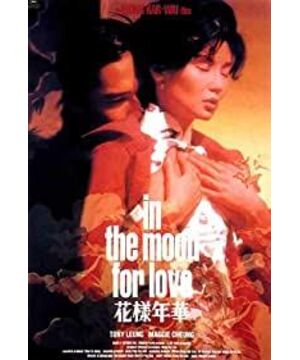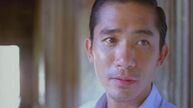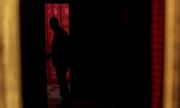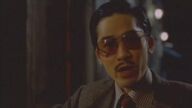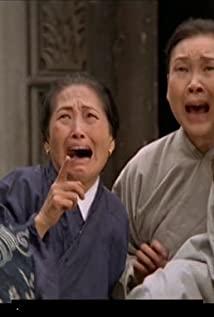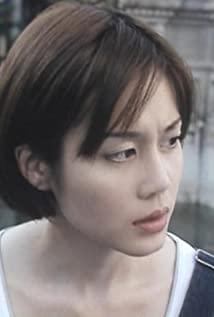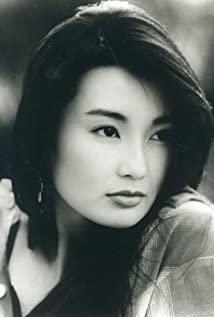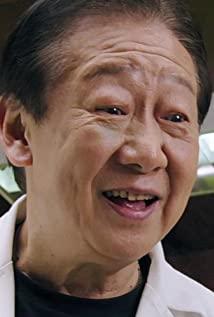Movies are the art of storytelling, but stories definitely have a theme. Wong Kar-wai used extramarital affairs as a background story, deeply telling how two frustrated middle-aged men and women approached love step by step. He used a lot of props to enhance the details. For example, when the two of them got wet for the first time, they each took out a white handkerchief to wipe the rain; Mr. Zhou's tie; Su Lizhen's embroidered slippers and leather bag; the lunch box she bought every night; Zhou Muyun's hand cigarettes lit from time to time; clocks from Su Lizhen's company. These are inconspicuous little objects, but in a sense they represent the plot development of the story. Two identical ties make Su Lizhen discover her husband cheating; two leather bags of the same style make Mr. Zhou discover his wife cheating; clocks and lunch boxes represent the loneliness of an abandoned woman; and cigarettes express the loneliness of a man cheated by his wife. The director uses these little details to convey emotions everywhere, rather than making the characters chatter and telling the story.
As long as the characters speak, what they say is a crucial subtext. For example, after Su Lizhen found out that her husband was cheating, she said to Mr. Zhou, "When two people are together, it is not enough for them to do well." The sadness and despair after the failure of the marriage are profound and painful. At the end of the movie, Mr. Zhou asked Su Lizhen: If there is one more ticket, will you come with me? It's an implicit expression; it's obviously "I love you," but if you have to hide it, the word "love" is always on the tip of your tongue, and you can't say it. This is the power of dialogue, blasting enormous energy with invisible echoes. The film is about Hong Kong in 1962, and the tone of the film is dark from beginning to end. Whether day or night, a lot of lights are used to make the bedding. The mottled walls of the street corner were reflected under the orange street lamps. Mr. Zhou and Su Lizhen met. One figure passed by, and the other came. One could see from their backs how the bone-eroding loneliness devoured their souls. The change in color shows that the two slowly connected after they knew about the betrayal. First, they investigated and confronted, then carefully verified, and then boldly simulated. Later, they unconsciously replace the abandoned one with another emotional one. feeling of pain.
Mr. Zhou moved to room 2046 of the hotel and waited for Su Lizhen to come to the appointment. Su Lizhen was wearing a red trench coat, and red curtains were specially used in the corridor of the hotel. Here, the director seems to compare red to the color of happiness, implying that the two are slowly approaching happiness or about to be happy. It's a pity that Su Lizhen was hesitant. The sound of high heels was up and down, and she never had the courage to walk into room 2046. In the end, Mr. Zhou sent Su Lizhen away, and the red curtains swayed in the wind, indicating that happiness drifted away like the wind. In the setting of the scene, the director also exhausted his mind. Su Lizhen and Mr. Zhou met on the street several times, and the camera shot was shot through the iron fence of the window, implying that they were two people in a cage. For the first time, the two talk about the infidelity of their husbands and wives, showing that they are in a moral prison and are reluctant to do things they think are shameful. The second time, the two fell in love unknowingly.
Mr. Zhou confessed on a rainy day, and there was an iron fence behind him, indicating that they were caught in the cage of love, struggling reluctantly but not finding an escape. Su Lizhen repeatedly stressed: We will not be the same as them. She used this sentence as a prison sentence, so that both of them had to endure the torment of love. The entire film uses a lot of metaphors, and if you don't appreciate them carefully, many of the clips will look plausible. Where did Su Lizhen's last child come from? Did the two ever meet again? In fact, in the second half of the film, one night, the two were sitting in a taxi together, and Su Lizhen leaned on Zhou Muyun's shoulder and said softly, "I don't want to go home tonight." This is another hint, which is also a foreshadowing of the future, and Yongsheng comes from this. As for Yongsheng's name, it's all a hint. Zhou Muyun likes to write martial arts novels. The best martial arts novelists in Hong Kong are Jin Yong and Liang Yusheng. Taking one word from the two names, he secretly told the audience that this child named Yongsheng was the child of Zhou Muyun and Su Lizhen. The music of the film is also used to the extreme. Every time Su Lizhen went out to buy noodles in the evening, she played jazz music. Originally, noble and foreign music were used here, but it brought out a lonely and desolate atmosphere. Such a beautiful woman, in the mood for love, was left at home by her husband alone. What a pity. Even so, the director felt that the contrast was not enough, and he had to use "In the Mood for Love" as the theme music, and again point out the question, implicitly expressing the thoughts and moods he wanted to express. It can be said that the director is generous with his feelings.
He does not criticize or tolerate anyone. Loss and gain, reunion and miss are all personal karma, and he is just telling us a story, a love story in which a man and a woman who are in their prime love each other but cannot be together. In the setting of the scene, the director also exhausted his mind. Su Lizhen and Mr. Zhou met on the street several times, and the camera shot was shot through the iron fence of the window, implying that they were two people in a cage. For the first time, the two talk about the infidelity of their husbands and wives, showing that they are in a moral prison and are reluctant to do things they think are shameful. The second time, the two fell in love unknowingly. Mr. Zhou confessed on a rainy day, and there was an iron fence behind him, indicating that they were caught in the cage of love, struggling reluctantly but not finding an escape. Su Lizhen repeatedly stressed: We will not be the same as them. She used this sentence as a prison sentence, so that both of them had to endure the torment of love. The entire film uses a lot of metaphors, and if you don't appreciate them carefully, many of the clips will look plausible. Where did Su Lizhen's last child come from? Did the two ever meet again? In fact, in the second half of the film, one night, the two were sitting in a taxi together, and Su Lizhen leaned on Zhou Muyun's shoulder and said softly, "I don't want to go home tonight." This is another hint, which is also a foreshadowing of the future, and Yongsheng comes from this. As for Yongsheng's name, it's all a hint. Zhou Muyun likes to write martial arts novels. The best martial arts novelists in Hong Kong are Jin Yong and Liang Yusheng. Taking one word from the two names, he secretly told the audience that this child named Yongsheng was the child of Zhou Muyun and Su Lizhen. The music of the film is also used to the extreme. Every time Su Lizhen went out to buy noodles in the evening, she played jazz music. Originally, noble and foreign music were used here, but it brought out a lonely and desolate atmosphere.
Such a beautiful woman, in the mood for love, was left at home by her husband alone. What a pity. Even so, the director felt that the contrast was not enough, and he had to use "In the Mood for Love" as the theme music, and again point out the question, implicitly expressing the thoughts and moods he wanted to express. It can be said that the director is generous with his feelings. He does not criticize or tolerate anyone. Loss and gain, reunion and miss are all personal karma, and he is just telling us a story, a love story in which a man and a woman who are in their prime love each other but cannot be together. In the setting of the scene, the director also exhausted his mind. Su Lizhen and Mr. Zhou met on the street several times, and the camera shot was shot through the iron fence of the window, implying that they were two people in a cage. For the first time, the two talk about the infidelity of their husbands and wives, showing that they are in a moral prison and are reluctant to do things they think are shameful. The second time, the two fell in love unknowingly.
Mr. Zhou confessed on a rainy day, and there was an iron fence behind him, indicating that they were caught in the cage of love, struggling reluctantly but not finding an escape. Su Lizhen repeatedly stressed: We will not be the same as them. She used this sentence as a prison sentence, so that both of them had to endure the torment of love. The entire film uses a lot of metaphors, and if you don't appreciate them carefully, many of the clips will look plausible. Where did Su Lizhen's last child come from? Did the two ever meet again? In fact, in the second half of the film, one night, the two were sitting in a taxi together, and Su Lizhen leaned on Zhou Muyun's shoulder and said softly, "I don't want to go home tonight." This is another hint, which is also a foreshadowing of the future, and Yongsheng comes from this. As for Yongsheng's name, it's all a hint. Zhou Muyun likes to write martial arts novels. The best martial arts novelists in Hong Kong are Jin Yong and Liang Yusheng. Taking one word from the two names, he secretly told the audience that this child named Yongsheng was the child of Zhou Muyun and Su Lizhen. The music of the film is also used to the extreme. Every time Su Lizhen went out to buy noodles in the evening, she played jazz music. Originally, noble and foreign music were used here, but it brought out a lonely and desolate atmosphere. Such a beautiful woman, in the mood for love, was left at home by her husband alone. What a pity. Even so, the director felt that the contrast was not enough, and he had to use "In the Mood for Love" as the theme music, and again point out the question, implicitly expressing the thoughts and moods he wanted to express. It can be said that the director is generous with his feelings.
He does not criticize or tolerate anyone. Loss and gain, reunion and miss are all personal karma, and he is just telling us a story, a love story in which a man and a woman who are in their prime love each other but cannot be together. The entire film uses a lot of metaphors, and if you don't appreciate them carefully, many of the clips will look plausible. Where did Su Lizhen's last child come from? Did the two ever meet again? In fact, in the second half of the film, one night, the two were sitting in a taxi together, and Su Lizhen leaned on Zhou Muyun's shoulder and said softly, "I don't want to go home tonight." This is another hint, which is also a foreshadowing of the future, and Yongsheng comes from this. As for Yongsheng's name, it's all a hint. Zhou Muyun likes to write martial arts novels. The best martial arts novelists in Hong Kong are Jin Yong and Liang Yusheng. Taking one word from the two names, he secretly told the audience that this child named Yongsheng was the child of Zhou Muyun and Su Lizhen. The music of the film is also used to the extreme. Every time Su Lizhen went out to buy noodles in the evening, she played jazz music. Originally, noble and foreign music were used here, but it brought out a lonely and desolate atmosphere. Such a beautiful woman, in the mood for love, was left at home by her husband alone. What a pity. Even so, the director felt that the contrast was not enough, and he had to use "In the Mood for Love" as the theme music, and again point out the question, implicitly expressing the thoughts and moods he wanted to express. It can be said that the director is generous with his feelings. He does not criticize or tolerate anyone. Loss and gain, reunion and miss are all personal karma, and he is just telling us a story, a love story in which a man and a woman who are in their prime love each other but cannot be together.
The entire film uses a lot of metaphors, and if you don't appreciate them carefully, many of the clips will look plausible. Where did Su Lizhen's last child come from? Did the two ever meet again? In fact, in the second half of the film, one night, the two were sitting in a taxi together, and Su Lizhen leaned on Zhou Muyun's shoulder and said softly, "I don't want to go home tonight." This is another hint, which is also a foreshadowing of the future, and Yongsheng comes from this. As for Yongsheng's name, it's all a hint. Zhou Muyun likes to write martial arts novels. The best martial arts novelists in Hong Kong are Jin Yong and Liang Yusheng. Taking one word from the two names, he secretly told the audience that this child named Yongsheng was the child of Zhou Muyun and Su Lizhen. The music of the film is also used to the extreme. Every time Su Lizhen went out to buy noodles in the evening, she played jazz music. Originally, noble and foreign music were used here, but it brought out a lonely and desolate atmosphere. Such a beautiful woman, in the mood for love, was left at home by her husband alone. What a pity. Even so, the director felt that the contrast was not enough, and he had to use "In the Mood for Love" as the theme music, and again point out the question, implicitly expressing the thoughts and moods he wanted to express. It can be said that the director is generous with his feelings. He does not criticize or tolerate anyone. Loss and gain, reunion and miss are all personal karma, and he is just telling us a story, a love story in which a man and a woman who are in their prime love each other but cannot be together.
View more about In the Mood for Love reviews


